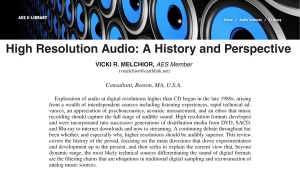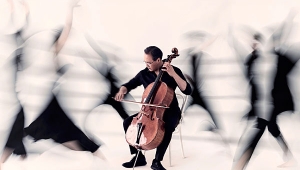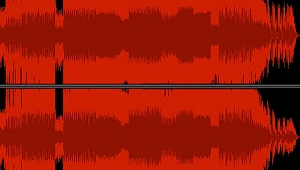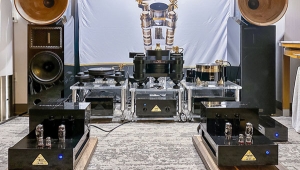| Columns Retired Columns & Blogs |
Reviews, "Recommended Components," & Metaphysics
In a dark, smoky office, a desk lamp beams a cone of light onto papers, books, pipes, and notepads. A theoretical physicist hunches over his desk, half-illuminated, visualizing the world inside his equations.
Masses move silently through space-time, through lines of force and gravitational fields. Energies expend and absorb. Symmetries couple and uncouple in an abstract, mathematical dance. But something isn't right—some hands aren't joining, some quantities need balance. This world is stilted. "What if....?"
He starts, grabs an eraser, and rubs away the symbol "+" in his fourth line of equations. A minus sign, "-", heals the wound.
Insensibly at first, motions reappear. Others take their cue. But, the dance has changed. One player moves backwards, forcing others to recombine into beautiful and unexpected patterns. This time, everything fits and balances. This world makes sense. Aha!
Theoretical scientists play God. When they reverse a mathematical sign, its bearer obediently turns on its heels. The price of this omnipotence, however, is truth. The worlds they create are fictions. They exist on paper and in the mind's eye of their creators. Some of these theoretical constructions tell the truth about nature—but which? When experimental tests are impossible, scientists rely on their gut feelings or, as philosophers say, their "intuitions." Einstein believed that an awkward, uneconomical theory could never be correct. "God is subtle," he said, "but He is not malicious." This intuition served Einstein well, but another led him down a blind alley. Einstein rejected much of quantum mechanics, for he insisted that God does not play dice. But that, most scientists believe, is the game nature plays. When they rely on such basic and fundamental beliefs about nature, scientists become metaphysicians. By "metaphysics," I don't mean the astral bodies and alien beings that haunt your local "metaphysical" bookstore, but rather the sober and difficult question, What is nature fundamentally and ultimately like? Does it have aesthetic properties, as Einstein believed? Why should it be that a beautiful theory is likely to be a true theory? Is nature itself essentially rational and knowable? Or, as Camus' Meursault hinted at the end of The Stranger, are beauty, reason, and truth merely subjective noises within the "benign indifference of the universe"?
Yes, metaphysical ponderings like these seem remote from the passions of audio. So imagine my surprise at the recent Stereophile writer's conference in Santa Fe when our discussion veered into some classic, metaphysical terrain. During one seminar, as copy editor Richard Lehnert offered tips and guidelines for writing equipment reviews, I felt as if I had wandered into the agora one sunny afternoon in ancient Greece.
Lehnertes: ...and remember: use the past tense when you describe a component's performance. Don't write "These speakers throw an impressive soundstage." Write that they "threw an impressive soundstage."
Telligus: Why Lehnertes? Why should we write in the past tense?
Fremertotle: Yes, Lehnertes, tell us. Wouldn't the present tense have more punch and energy? We do want our papyri to be lively and entertaining. Oh, and Telligus, there's soup on your toga.
Lehnertes: The present tense says too much about a component—it requires some metaphysical assumptions that just aren't warranted. Plato, whom all of you probably know, wrote a review that read, "These speakers throw a soundstage as wide as the walls of my cave," and....
Scullipides: Of course Plato wrote that, Lehnertes. Many speakers throw a soundstage as wide as the Arc de Triomphe, especially when three drachmas are placed on top. What's the problem here?
Lehnertes: For starters, the Arc de Triomphe doesn't exist yet, and neither does evidence that Plato's speakers will always have that characteristic....
Wise Lehnertes was on to something deep. Like scientists, equipment reviewers must deal with the perils of induction—the process, as Webster's puts it, of reasoning from a part to a whole, or from the individual to the universal. Many use metaphysics to get around the dangers involved, but in the end, it rarely works. Imagine that you are an ornithologist studying a newly discovered bird. They're called "snaws," and they're big, with white feathers. As you encounter snaws, you formulate a hypothesis by asking, Are all snaws white? Examine the snaws in Australia, in Africa, and those described by other naturalists. Yes! They're all white. Now you can make an inductive leap and propose a new law of nature: All snaws are white. If you're right, you might just get an early morning phone call from the Nobel Foundation in Stockholm.
But there's a problem. As the late philosopher Sir Karl Popper would insist, you lack firm evidence that your law is true. You can examine snaws throughout the world, even on other planets and galaxies (if they exist there), but logic forbids the inductive leap from "these particular snaws are white" to "all snaws are white" unless you can prove, in addition, that the snaws you have examined are, in fact, all the snaws that exist. That, however, is impossible. There may be some hiding in distant recesses of the universe that are red and green striped, and what about the snaws that will be born after you are dead? You're stuck. Of course, you could just announce to your colleagues that "some snaws are white," but that doesn't sound very impressive. Go with "All snaws are white" and keep your fingers crossed.
- Log in or register to post comments




































